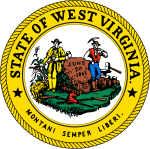| ||||||||||||||||||||||||||||||||||||||||
17 of 34 seats in the West Virginia Senate 18 seats needed for a majority | ||||||||||||||||||||||||||||||||||||||||
|---|---|---|---|---|---|---|---|---|---|---|---|---|---|---|---|---|---|---|---|---|---|---|---|---|---|---|---|---|---|---|---|---|---|---|---|---|---|---|---|---|
| ||||||||||||||||||||||||||||||||||||||||
Holds and gains: Democratic hold Republican gain Republican hold
| ||||||||||||||||||||||||||||||||||||||||
| ||||||||||||||||||||||||||||||||||||||||
| Elections in West Virginia |
|---|
 |
The 2004 West Virginia Senate election took place on Tuesday, November 2, 2004, to elect members to the 77th and 78th Legislatures; held concurrently with the presidential, U.S. House, and gubernatorial elections. [1] State senate seats in West Virginia are staggered, with senators serving 4-year terms. 17 of the 34 state senate seats were up for election. While Republican candidate for George W. Bush won the state in the presidential election by 13 points, the Democratic Party won a majority of the vote for state senate candidates. Republicans managed to flip 3 seats, chipping away at the Democrats' supermajority. [2]



